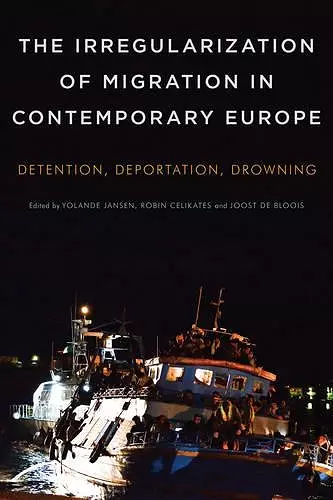The Irregularization of Migration in Contemporary Europe
Detention, Deportation, Drowning
Yolande Jansen editor Robin Celikates editor Joost de Bloois editor
Format:Paperback
Publisher:Rowman & Littlefield International
Published:12th Dec '14
Currently unavailable, and unfortunately no date known when it will be back
This paperback is available in another edition too:
- Hardback£137.00(9781783481699)

Working from an interdisciplinary perspective that draws on the social sciences, legal studies, and the humanities, this book investigates the causes and effects of the extremities experienced by migrants. Firstly, the volume analyses the development and political-cultural conditions of current practices and discourses of “bordering,” “illegality,” and “irregularization.” Secondly, it focuses on the varieties of irregularization and on the diversity of the fields, techniques and effects involved in this variegation. Thirdly, the book examines examples of resistance that migrants and migratory cultures have developed in order to deal with the predicaments they face. The book uses the European Union as its case study, exploring practices and discourses of bordering, border control, and migration regulation. But the significance of this field extends well beyond the European context as the monitoring of Europe’s borders increasingly takes place on a global scale and reflects an internationally increasing trend.
This book engages with one of the most pressing problems facing Europe today. With drownings and deaths reported at the European borders nearly daily, there is a genuine need for better empirical understanding and novel social imaginations to inform political agendas. Understanding Europe as a space of experimentation, this collection succeeds in offering an original perspective on global border practices and their multifaceted contestations. Compulsory reading for researchers, activists, and policy-makers. -- Marieke de Goede, Professor of Political Science, University of Amsterdam
This is not another book about borders, migration, and injustice. This fine collection of essays is distinctive because it grasps the present as a situation—a state of affairs we have arrived at, a place we find ourselves in the midst of, yet struggle to see beyond. How has the violence and unfreedom of irregular migration become regular? What kind of a people, what form of government could tolerate such a situation? Anyone interested in these questions should read this book. -- William Walters, Professor at the Department of Political Science and the Department of Sociology and Anthropology at Carleton University
In the rich and complex scholarship addressing the new regime of borders that construct modes of individualization and stratification in the world of global neo-liberalism, this collection does not just update our information and debates. It comes to occupy a strategic place, at the junctures of the institutional and the cultural, the theoretical and the militant. By emphasizing the extreme violence involved in the politics of irregularization of migrants and refugees, which form the invisible side of the rule of law in Europe, but also the subjective resistances answering it, the chapters in this volume powerfully contribute to the devising of a democratic alternative. -- Etienne Balibar, Distinguished Professor at the University of California Irvine and Professor Emeritus at Université de Paris X
[A] remarkable contribution to the interdisciplinary field of critical border studies. This book will be of interest to theoreticians and practitioners working in the field of migration, as it provides insight into the political, normative, economic, and cultural dimensions of the establishment and crossing of borders in Europe today. -- Inga Schwarz, Cultures of Mobility in Europe, University of Freiburg * Border Criminologies *
This volume offers important insights for anyone concerned with the challenges to assimilation in European society for immigrant groups. [It] challenges the conception of borders as singular lines separating geographic areas, instead defining them as bureaucratic, cultural, and legal barriers that do little to restrict movement but are nonetheless remarkably successful at entrenching class distinctions. It also raises the question of why the freedom of movement – unlike political, religious, and economic freedoms – is rarely championed by the affluent world as an inherent human right. * Journal of International Affairs *
ISBN: 9781783481705
Dimensions: 229mm x 152mm x 19mm
Weight: 390g
262 pages